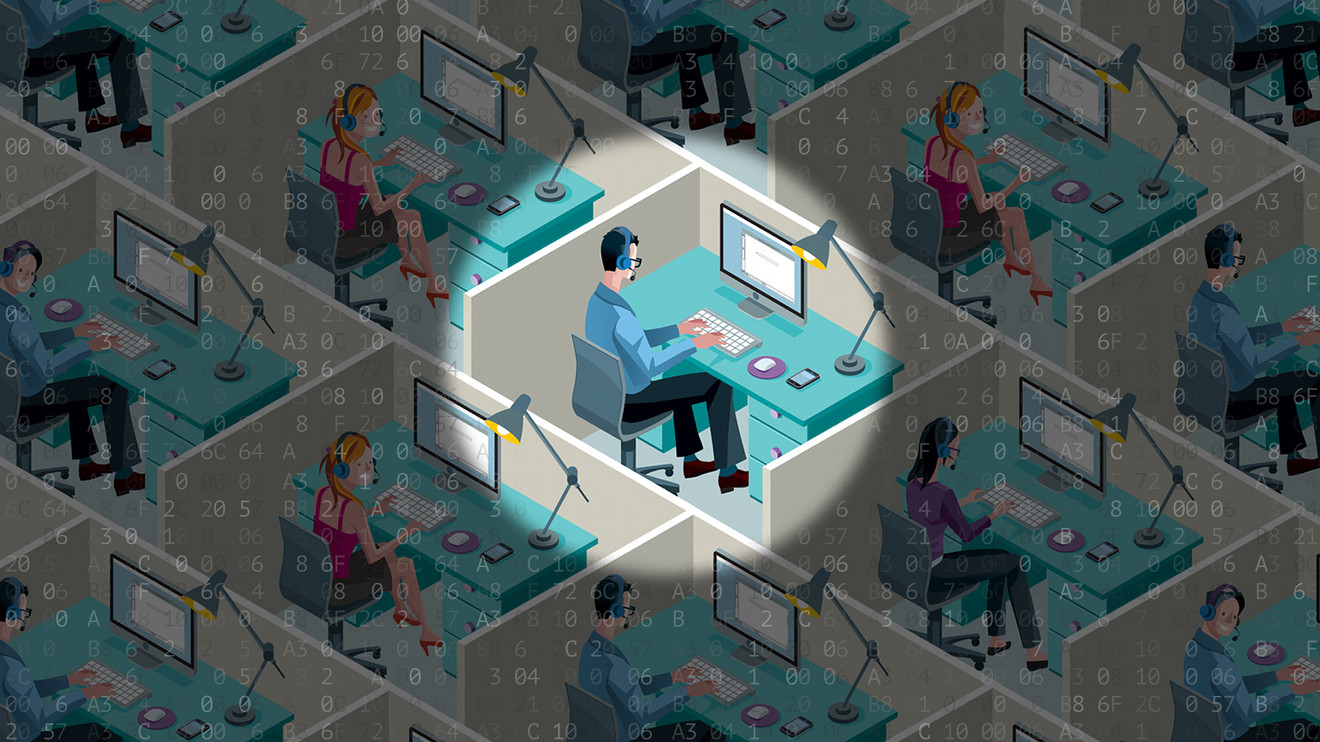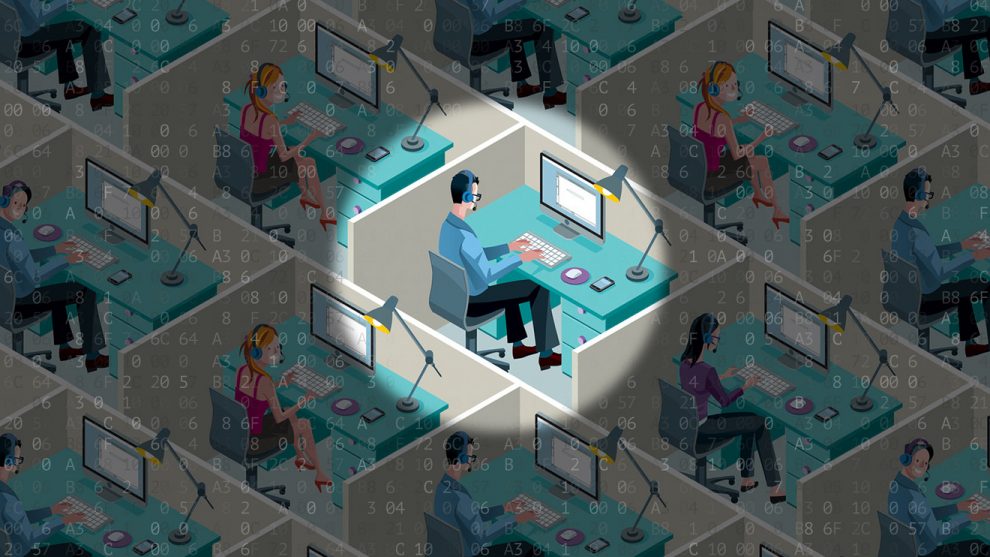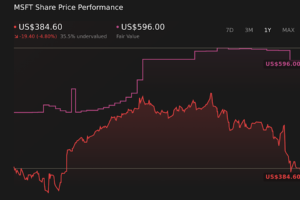
As public outrage mounts over Big Tech’s intrusions into personal privacy, few people consider the information they fork over to their employers every moment of every day.
Consumer advocates continue to raise questions about the data people willingly give up to companies like Facebook FB, -0.48% , Equifax EFX, +3.45% , Amazon and Apple AAPL, +0.35% . But employers are keeping closer tabs than ever on workers: A 2018 survey of 239 large companies by the research and advisory firm Gartner found that more than half of companies — a jump from 30% three years earlier — used “some type of nontraditional monitoring techniques,” which included tactics like analysis of email and social-media messages, and collection of biometric data.
‘It’s increasingly difficult to get people to care enough about these workplace intrusions.’
And as the prevalence of such monitoring increases, so does employees’ willingness to accept it, particularly if an employer is transparent: Gartner found that three in 10 workers in 2018, versus one in 10 in 2015, felt comfortable with employer email monitoring. More than half felt comfortable after learning the reasons behind the tracking.
“It’s increasingly difficult to get people to care enough about these workplace intrusions to the point that there’s any pushback at all, much less what you would need to effectively prevent an employer from doing it,” employment attorney Paula Brantner, the president and principal of the firm PB Work Solutions, told MarketWatch.
Despite our having a fundamental right to privacy, we’ve essentially “given it up,” added Raleigh-based human resources consultant Laurie Ruettimann. “We’ve said, ‘You know what, we’ll give you a little bit of our data in exchange for a paycheck,’” she said.
Despite our having a fundamental right to privacy, we’ve essentially given it up.
There are three main ways employers monitor their staff, said Ifeoma Ajunwa, an assistant professor at Cornell University’s Industrial and Labor Relations School. Those include location tracking through a company-issued phone’s GPS or an employee ID badge, communication monitoring through email monitoring, Slack messages WORK, +1.10% or keystroke logging, and wellness programs that track health data, including sleep patterns.
Plenty of blue-collar employees have also increasingly found themselves being watched. Amazon AMZN, -1.56%, for example, reportedly tracks each worker’s productivity.
(A company spokeswoman told MarketWatch that “the system being referred to simply tracks and ensures consistency of data and processes across hundreds of employees to ensure fairness.” “Furthermore, our scanning process is to track inventory movement, not people,” she added. “The scanning devices we use for our inventory are common across the warehouse and logistics sector as well as in super markets, department stores and other businesses.”)
The Wisconsin-based tech company Three Square Market made news in 2017 for implanting microchips in employee volunteers, offering them a more seamless means to open doors and make purchases in the break room. (The company has maintained it has “zero interest in tracking anyone.”)
Legal protections against worker surveillance
State-level protections against worker surveillance vary, and Ajunwa and her co-authors of a 2017 paper argued that “we cannot depend on each individual state’s legislature to accomplish — piecemeal — the work of protecting workers.”
“There are no federal laws against workplace surveillance — generally, employers have carte blanche to install any surveillance monitoring systems in the workplace or on work equipment,” Ajunwa said. “The one caveat is that such surveillance becomes illegal when used to harass employees or to effectuate employment discrimination.”
‘There are no federal laws against workplace surveillance — generally, employers have carte blanche to install any surveillance monitoring systems in the workplace or on work equipment.’
What’s more, it can be difficult for employees to detect many types of surveillance on company-provided devices, said Seth Schoen, a senior staff technologist at the Electronic Frontier Foundation — “and essentially impossible if the employer wants them to remain clandestine.”
“The employer would have almost unlimited scope to tamper with the hardware and software in order to install monitoring tools, and there’s no guarantee that an employee could expect to find those tools,” Schoen said in an email.
“I’m confident that a technically sophisticated employer or IT department can readily set up surveillance features on devices that users won’t be able to locate,” he added, “especially if they aren’t given administrative access.”
(The one thing an employee could check, Schoen added, is “whether an employer is using its own certificate authority to intercept their HTTPS communications.”)
But there are some steps you can take to shield yourself from corporate Big Brother’s gaze and minimize your own risk. Here’s what experts advise:
When in doubt, assume you’re being watched. “Generally speaking, if you are worried about your privacy in the workplace, I would just act on the assumption that anything you do on corporate email, on corporate Wi-Fi, on a corporate laptop or in a corporate space can be tracked and surveilled,” said Tiffany Li, a tech attorney and fellow at Yale Law School’s Information Society Project.
“This can include anything from a camera that records what’s happening in the office to software that tracks employee activity on corporate loaner laptops,” she added. “So maintaining professionalism is important even when you can’t physically see people watching you.”
Slack updated its privacy policy last year to allow employers subscribing to its premium plans to download workers’ private messages without their knowledge.
Not even your Slack messages are sacred: The workplace-software company updated its privacy policy last year to allow employers subscribing to its premium plans to download workers’ private messages without their knowledge.
And while most corporate employers likely understand that employees will take a break during the day to peruse the news or scroll through Zappos, Ruettimann said, “you should understand that they know” about such non-work-related activity.
Keep work business separate from personal business. Ruettimann recommends maintaining personal devices that are separate from your work devices, making sure not to connect personal electronics to your company’s wireless network.
“Anything hooked up, generally, to your company’s Wi-Fi can be scanned and explored based on the terms and conditions of your employer,” she said. Even if you’re a contractor or consultant, she added, you may be treated the same as an employee when it comes to devices.
Is there tracking software on your company computer or phone? Is your email being logged? What employee data is being collected or stored? And who has access to employee data?
The same goes for using email. “One mistake [people] often make is treating their corporate email as their personal email,” Li said.
Understand what information you’re handing over. Employees should rely on laws or union contracts that require monitoring to be disclosed, Schoen said, and on asking HR to proactively disclose monitoring.
If you approach your HR or IT departments with your concerns, said Li, you could ask to see documents related to your company’s employee privacy policy. You might also ask a few specific questions, she added: Is there tracking software on your company computer or phone? Is your email being logged? What employee data is being collected or stored? And who has access to employee data?
To that end, read documents and contracts carefully. “A lot of [monitoring] has to be agreed to by the employees, but this often occurs in your onboarding contract or in your hiring contract, so you don’t really look at it often,” Li said. Read your contract, onboarding paperwork and any corporate trainings or documents, Li said, as they will sometimes contain specific provisions on what your employer tracks in the workplace.
Think carefully about health and wellness at work. An employer may keep track of whether you used your employee assistance program (EAP) or took part in the company 5K run, Ruettimann said. Workplace wellness programs may also monitor how often you exercise or whether you go to the gym, Brantner said, with some even offering a discount on what you pay toward health insurance.
“That’s an individual decision, but I think people should be aware that there are these privacy implications and you may be sharing more information about your health and your off-duty activity than you care to share with your employer — that any discount you get may have its own price,” she said.
Be cautious about sharing personal health information on your work laptop — like WebMD visits or searches for fertility treatments — that may inadvertently end up in your employer’s hands.
And be cautious about sharing personal health information through your work laptop — like WebMD visits or searches for fertility treatments — that may inadvertently end up in your employer’s hands.
“That is not supposed to be taken into account when you make decisions about someone’s employment status,” Brantner said. But if an employee’s performance is borderline as annual reviews approach, or the company has to select employees for layoffs, that health information could unconsciously creep into decision-making even if the company tries to handle it in a nondiscriminatory manner, she said.
Realize that your communications could face scrutiny as part of a fellow employee’s lawsuit. “Often if the company is sued by one of their employees, some of your information may end up as evidence in a lawsuit,” Brantner said. “Typically in that process, the employer will request certain documents that can be evidence in the lawsuit — so you should be aware that some of your communication could be reviewed at a later date.”
Instead of quitting, try to change things from the inside. “I’ve been trying to encourage people who are outraged by all of this to get promoted and to get into positions of power,” Ruettimann said. “You don’t fix anything by leaving it — you fix things by sticking with it and by understanding systems and fixing the systems that you work within.”







